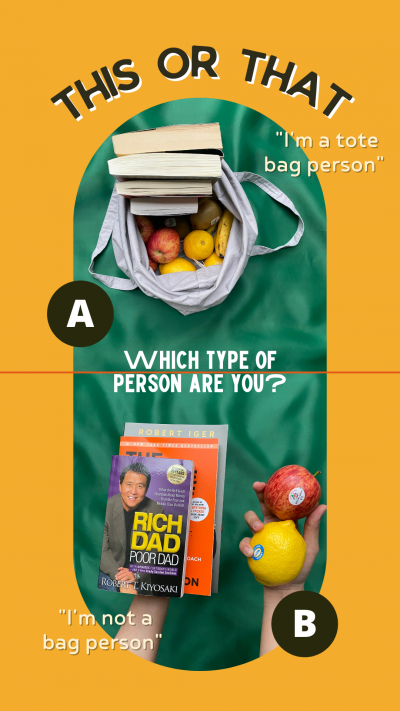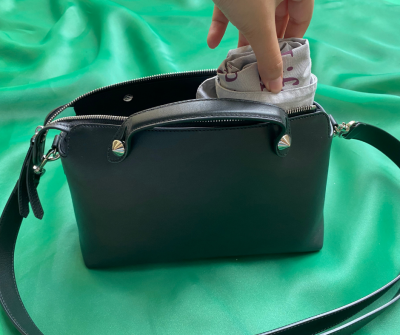
Are Cotton Tote Bags More Environmentally-Friendly Than Plastic Bags?
The following stories are very likely to have happened to you. You are at the check-out station to pay for your clothes, groceries, or books; then it occurs to you that you forget to bring your reusable bag. So, you decide to buy the store’s cotton tote bag because you think it is more environmentally friendly than a plastic bag. Another story would be: you often collect promotional tote bags from brands where you bought something. Well, if they did not happen to you, at least these scenarios did happen to me. In fact, I love buying cute cotton tote bags even if I’m not in a position where I have to buy one. Because I know by buying them, I contribute to the environment, and I get to represent myself as an environmentally conscious person when I use them as a carry-all. But a couple of days ago, a question struck my mind: are cotton tote bags really eco-friendly?

“Which type of person are you?”
Cotton totes are obviously made from cotton
The tote is made of a renewable resource: harvested cotton, which is then baled and turned into threads (Cho, 2020). They are woven into the fabric and later subjected to a chemical washing and bleaching process before being coloured and printed. The good news is cotton bag is biodegradable. They are, too, sturdy and long-lasting; thus, they may be used forever and a day. As a result, these “green” tote bags have been acclaimed as the answer to the environmental problem caused by single-use plastic bags. Not wanting to ignore the trend, companies produce large amounts of cotton totes to bag up purchases, which functions as a mobile billboard for them (Cook, 2021). Hence, people—like me, and perhaps you—end up with a pile of cotton totes at home.
So, are they really eco-friendly?
After spending more than thirty-six hours trying to find the answer, I finally found it. But, it is not what I expected. According to the New York Times, having a large number of cotton totes—albeit our intention to curb the use of single-use plastic bags—is not genuinely sustainable living (Cook, 2021). The abundance of cotton totes is causing significant problems for our already precarious climatic situation. Shocking, I know.
A 2018 research conducted by Denmark’s Ministry of Environment and Food found that to offset the environmental impact of one organic cotton tote, a person would have to use it 20,000 times—or every day for fifty-four years. Cotton production uses a crazy amount of water, as stated by Travis Wagner (Cook, 2021). Although they are biodegradable, not all cotton totes are recyclable. If the brand who donated it to you didn’t use PVC-based logos and dyes to cover it, your crusty old totes would be able to be recycled. However, cotton totes with logos, designs, and slogans printed on the bags are not recyclable. Therefore, according to textile recycling and sustainability specialists, they must be taken out of the cloth, losing an estimated ten per cent to fifteen per cent of cotton received by a single recycling firm (Ng, 2021).
What do we do now?
Does it mean we should go back to single-use plastic bags? Should we ditch all types of carry-all and carry our stuff in our own hands? Relax, friends. I’ve got you covered. The problem with shopping bags is not what the material is made of, but how many times we can use it. In other words, we have to use one bag repeatedly and say NO to ALL single-use shopping bags, even if the bags are made of the most recyclable materials in the world. Tomas Ekvall—the author of a United Nations Environment report on single-use plastic bags—notes (Chan, 2021), “Rather than buying a new bag, utilize the one you already have at home, whether it’s cotton, paper, or plastic.”
However, our endeavour would not be enough to prevent us from being awash with cotton totes. Hence, we need to stop brands from giving out free logo stamped totes that serve as free advertising. Sigh. I know, no more free totes. As Dillon (2016) states, we must not let brands instil the notion that cotton carry-all is disposable, eliminating its initial purpose. By bringing our reusable cotton totes and refuse to bring home new and free totes from brands, we could stop companies from doing so.

Don’t forget to bring your cotton tote bag!
Summary
Cotton carry-all has been heralded as the answer to curb single-use plastic bags in today’s era due to its biodegradability. However, it is proven that how people use these “green” totes are not very sustainable, which eventually can wipe out the initial purpose of the bag. Therefore, to stop this from continuing, we must make the most of our cotton tote bags by reusing them as frequently as possible and avoiding amassing more than we require.
References:
Chan, E. (2021, August 27). Are our cotton tote bags really doing more harm than good? British Vogue. Retrieved October 14, 2021, from https://www.vogue.co.uk/news/article/are-cotton-tote-bags-bad-for-environment.
Cho, R. (2020, May 1). Plastic, paper or cotton: Which shopping bag is best? State of the Planet. Retrieved October 14, 2021, from https://news.climate.columbia.edu/2020/04/30/plastic-paper-cotton-bags/.
Cook, G. (2021, August 24). The cotton tote crisis. The New York Times. Retrieved October 14, 2021, from https://www.nytimes.com/2021/08/24/style/cotton-totes-climate-crisis.html.
Dillon, N. (2016, September 2). Are tote bags really good for the environment? The Atlantic. Retrieved October 14, 2021, from https://www.theatlantic.com/technology/archive/2016/09/to-tote-or-note-to-tote/498557/.
Ng, K. (2021, August 26). Cotton tote bags not as environmentally-friendly as you might think, says report. The Independent. Retrieved October 14, 2021, from https://www.independent.co.uk/climate-change/sustainable-living/cotton-tote-bags-sustainable-shopping-b1909035.html.
